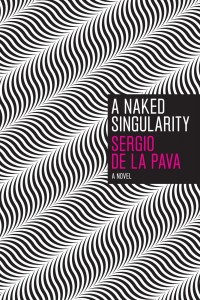 Yeah, I’m writing my Saturday book review on a Sunday. And yeah I haven’t written a book review in weeks. But A Naked Singularity is a freaking 700 page novel, and not an easy read.
Yeah, I’m writing my Saturday book review on a Sunday. And yeah I haven’t written a book review in weeks. But A Naked Singularity is a freaking 700 page novel, and not an easy read.
I’ve never gotten through Moby Dick, or Ulysses, and must confess that although I have referenced him shamelessly, I’ve got a problem with Faulkner. David Foster Wallace has too many footnotes. As for Pynchon, only The Crying of Lot 49. So I am proud that I least got through this massive piece of work.
For those unaware, Sergio de la Pava’s debut novel started out in the world in 2008 as self-published fiction. It gained a following, and some VIP raves and wound up being published by the University of Chicago Press. 2012. In August of 2013, it was awarded the PEN/Robert W.Bingham Prize given to a promising first published novel or story collection.
I probably shouldn’t review it or should as WW (not Walt Whitman) might say “tread lightly,” lest I be accused of venting my extreme envy of the writer’s success. You have no idea what the depth of my schadenfreude would be should it be discovered that de la Pava actually plagiarized the unpublished work of a dying colleague or put it together by cutting and pasting from different classics. While some self-published authors may dream of the commercial success of Amanda Hawking, Colleen Hoover, Hugh Howey etc, – I’d sell my immortal soul for the critical acclaim of those important enough to convince others of their importance.
But as no one outside of a small circle of friends will ever read this post, I’m free to review, however biased my conclusions.
A Naked Singularity is not a great novel, but it has greatness in it. The flaws are in its reach and exuberance. It reads like it was written by someone who read and absorbed everything, but never had the opportunity to sit in a writing workshop and watch his darlings get slaughtered by his peers.
In a dazzling first chapter, we meet our protagonist, Casi, a brilliant young public defender in the City of New York. His pre-court conversations with his clients in which they recount the circumstances that brought them to One Centre Street are at times as laugh-out-loud funny as they are Continue reading Your Saturday Book Review: A Naked Singularity